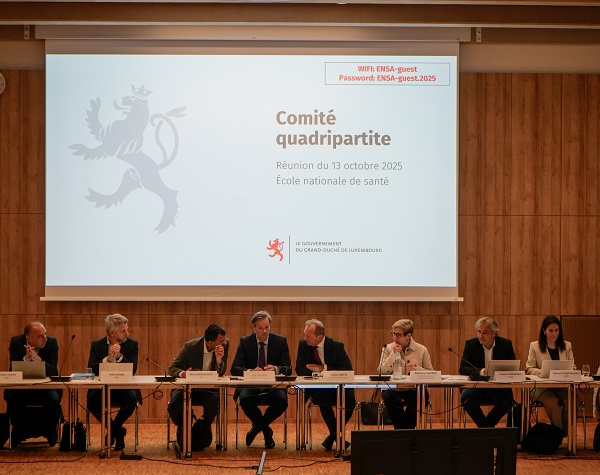 (L-R) Christian Oberlé, CNS President; Cedric Neiens, CNS Board; Nima Ahmadzadeh, IGF Director; Luc Feller, government advisor; Minister Gilles Roth; Minister Martine Deprez; Thomas Dominique, IGSS Director; Vanessa Di Bartoloméo, IGSS Deputy Director;
Credit: © M3S
(L-R) Christian Oberlé, CNS President; Cedric Neiens, CNS Board; Nima Ahmadzadeh, IGF Director; Luc Feller, government advisor; Minister Gilles Roth; Minister Martine Deprez; Thomas Dominique, IGSS Director; Vanessa Di Bartoloméo, IGSS Deputy Director;
Credit: © M3S
Luxembourg's Ministry of Health and Social Security and the Ministry of Finance have presented an analysis of the financial situation of the health and maternity insurance scheme.
The quadripartite committee met at the National School of Health in Strassen on Monday 13 October 2025, chaired by Luxembourg's Minister of Health and Social Security, Martine Deprez, in collaboration with the Minister of Finance, Gilles Roth.
Provided for in Article 80 of the Social Security Code, the quadripartite committee is convened by the minister responsible for social security and brings together all parties involved in the governance and operation of health and maternity insurance. These include the government, representatives of professional employee and employer organisations, as well as healthcare provider representatives. The committee examines the evolution of health revenue and expenditure and proposes legal, regulatory, contractual or statutory measures to be taken relating to health and maternity insurance, as well as any other measures aimed at improving the efficiency of the health system - taking into account population needs, developments in medical technology and available resources.
On Monday, the committee examined the financial situation of the health and maternity insurance scheme for 2025 and presented financial forecasts for 2026. It also unveiled a roadmap defining a gradual adjustment path aimed at restoring a healthy and sustainable financial situation.
Financial situation
The ministries noted that the downward trajectory observed in recent years continues to intensify. According to the latest estimates, the health and maternity insurance scheme is expected to record an operating loss of €118.6 million for the 2025 financial year. By comparison, 2024 already ended with a deficit of €25.8 million in current operations.
According to accounting data, expenses are projected to rise by 7.2% in 2025, reaching €4.879 billion, while revenue is expected to grow by only 5.2% to €4.76 billion.
The current operations balance thus continues the downward trend that began in 2020 (with the exception of 2023). The reserve is forecast to fall from €936 million in 2024 (20.6% of current expenditure) to €817.3 million in 2025 (16.8% of current expenditure).
According to the latest estimates, the 2026 fiscal year could record a deficit of around €209.3 million in current operations. In this context, the ministries highlighted the State's commitment to providing €59 million in state funding between 2026 and 2030, thus supporting, through lump-sum financing, the National Health Fund (CNS).
The cumulative overall balance is expected to decline further to €608 million, or 11.7% of estimated current expenditure for 2026. The overall contribution rate - currently 5.60%, with an additional 0.50% for cash benefits - can be legally maintained for 2026.
However, multi-year projections indicate a continued downward trend, suggesting that the minimum legal threshold of 10% of the overall reserve could fall below the required level by 2027.
Roadmap
Following the 2024 quadripartite meeting, representatives from the Ministry of Health and Social Security, the General Inspectorate of Finance (IGF), the General Inspectorate of Social Security (IGSS), the CNS and the CNS Board of Directors (representing social partners) met several times, under the chairmanship of Minister Deprez, to develop proposals aimed at sustainably improving the funding trajectory of health and maternity insurance.
Several measures were subsequently selected and presented to the quadripartite committee, to be reviewed and supplemented by proposals from professional groups.
Among the potential short-term measures are the medical oversight of certain services, such as drug (medication) prescriptions, laboratory tests and physiotherapy sessions, which could reduce expenditure by around €60 million. Other measures, which require legislative changes, include combating drug waste and strengthening controls against abuse and fraud within the CNS, as well as increasing state funding. Together, these measures could additionally reduce expenditure by about €80 million.
These measures will now be further developed and supplemented with professional groups within dedicated thematic working groups. An initial assessment is expected to be presented at the next quadripartite meeting in spring 2026.
At the end of the meeting, Minister Deprez presented the roadmap for restoring the funding trajectory based on joint commitments from both ministries.
She welcomed the progress made since the last quadripartite committee meeting, stating: "I would like to thank the Minister of Finance for his commitment to finding a lasting solution to improve the financial situation of health and maternity insurance. I also express my gratitude to the social partners for their engagement and constructive collaboration in this process. Based on the State's commitments and the identified measures, it is up to the quadripartite committee to move forward together to contribute to a sustainable system of access to care that places the insured person, and the patient, their needs and their interests at the centre."








